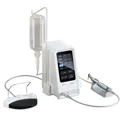
A Clinical Trial Management System (CTMS) is an essential tool in the world of clinical research, streamlining the complex processes involved in managing clinical trials. It is a software solution designed to handle the planning, tracking, and management of clinical trial data while ensuring compliance with regulatory standards. With its capability to enhance efficiency and data accuracy, CTMS plays a vital role in the success of clinical research initiatives.
Key Functions of a CTMS
A CTMS offers a comprehensive suite of tools to manage the various aspects of clinical trials, including:
Trial Planning and Setup
A CTMS enables researchers to define trial objectives, timelines, and protocols. It facilitates the selection of investigators, study sites, and required resources, ensuring a streamlined start to the trial process.
Participant Management
Keeping track of participants, their enrollment status, and demographics is made simpler with CTMS. It ensures seamless communication and engagement with study participants throughout the trial.
Regulatory Compliance
Compliance with regulatory authorities like the FDA and EMA is critical. CTMS systems for clinical trials ensure documentation, protocols, and data meet stringent regulatory standards.
Financial Management
Managing budgets, tracking expenses, and processing payments for trial sites are crucial. A CTMS provides tools to monitor financial aspects effectively.
Monitoring and Reporting
Real-time tracking of trial progress, data collection, and monitoring key performance indicators (KPIs) are streamlined using CTMS software. It also generates detailed reports for stakeholders.
Data Integration
CTMS integrates seamlessly with other clinical data management systems to consolidate information from various sources, providing a unified view of trial data.
Benefits of Clinical Trial Management Systems
Implementing a robust clinical trial management system provides several benefits:
Enhanced Efficiency
CTMS automates repetitive tasks such as data entry, scheduling, and report generation, saving time and reducing errors.
Improved Data Quality
Centralized data management ensures consistency and reduces discrepancies in trial data.
Regulatory Adherence
By maintaining thorough documentation and audit trails, CTMS simplifies compliance with international regulatory requirements.
Real-Time Insights
Researchers and sponsors gain real-time visibility into trial progress, enabling quick decision-making and issue resolution.
Cost-Effectiveness
By streamlining processes and reducing manual work, CTMS minimizes operational costs associated with clinical trials.
Collaboration and Communication
CTMS fosters better collaboration among stakeholders by providing a centralized platform for information sharing and communication.
Types of CTMS Solutions
Different organizations may require tailored clinical trial management solutions based on the size and complexity of their trials. Common types include:
Enterprise CTMS
Designed for large-scale organizations conducting multiple, complex trials, enterprise CTMS solutions offer advanced features like integration with clinical data management systems and financial management tools.
Cloud-Based CTMS
Cloud-based solutions provide accessibility and scalability, making them ideal for small to medium-sized research teams or organizations with limited IT resources.
On-Premises CTMS
On-premises CTMS offers more control over data but requires significant IT infrastructure and maintenance efforts.
Custom CTMS
Tailored systems address specific organizational needs, offering flexibility and unique functionalities.
Key Features to Look for in a CTMS
When selecting a clinical trial management software, organizations should prioritize the following features:
User-Friendly Interface
An intuitive interface ensures easy navigation for all users, reducing training requirements.
Integration Capabilities
A good CTMS should integrate seamlessly with electronic data capture (EDC) systems, laboratory information systems (LIS), and other clinical data management systems.
Customizable Workflows
Flexibility to configure workflows to match specific trial needs is essential.
Advanced Reporting Tools
Comprehensive reporting and analytics tools provide actionable insights for trial optimization.
Data Security and Compliance
Robust security features and compliance with data protection regulations like GDPR and HIPAA are critical.
CTMS in Modern Clinical Research
In today’s fast-paced clinical research landscape, clinical trial management systems are indispensable. These systems are not just tools for data organization but are vital for enhancing collaboration among researchers, ensuring compliance, and delivering faster results. As clinical trials become more complex, integrating innovative technologies like artificial intelligence (AI) and machine learning (ML) into CTMS is shaping the future of research.
For instance, modern CTMS solutions can leverage AI to predict participant dropout rates or optimize site selection. Similarly, ML algorithms can analyze historical data to identify trends that improve trial outcomes.
Choosing the Right CTMS
Selecting the right CTMS depends on an organization’s specific requirements. Here are some tips:
Assess Organizational Needs
Determine the scale and complexity of trials to identify essential features.
Evaluate Vendor Expertise
Choose vendors with proven experience in delivering clinical trial management solutions.
Scalability
Ensure the CTMS can scale to meet future requirements as the organization grows.
Cost-Benefit Analysis
Balance the cost of implementation against the expected benefits and efficiencies.
Conclusion
A clinical trial management system (CTMS) is a cornerstone of successful clinical research, streamlining operations, improving data quality, and ensuring regulatory compliance. With a wide array of clinical trial management solutions available, organizations can select systems tailored to their unique needs. By adopting robust clinical trial management software, research teams can enhance efficiency, reduce costs, and accelerate the development of groundbreaking therapies. As technology advances, CTMS systems are poised to play an even more pivotal role in shaping the future of clinical trials.
You Might Like Also

What is Laravel Development and Why Should You Care?

Getting Started with Laravel: A Beginner's Guide
















